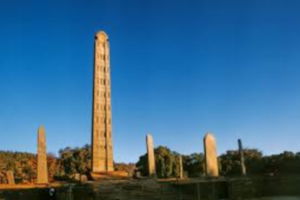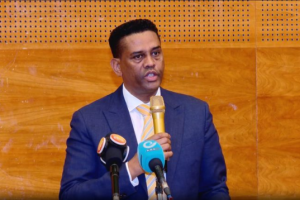
Ambassador Elman Abdullayev
Shall we start with giving you a chance to start with commenting on the reforms underway in Ethiopia?
It has always been a pleasure to work with the Ethiopian media. I really appreciate this opportunity. Of course, when it comes to the reform, it has taken place at a very crucial moment in the history of Ethiopia.
This reform is not only important for Ethiopia but also significant for Africa. The reform in Ethiopia is important for the entire region. Especially the role of the new prime minister of Ethiopia is great, both domestically and regional.
I would call it a very historical one because the major catchwords for the reform are reconciliations as well as consolidations of all the efforts. The two major points that I would like to focus upon while mentioning the reform is the domestic, political and economic improvements and also, at the regional reconciliation level, between Ethiopia and Eritrea and the entire East African region.
These are the two very important things when it comes to a talk about Ethiopia. I definitely have to mention the regional also as Ethiopia is a very important country of the region.
The domestic political wind and the regional reconciliation task are the two processes going in parallel due to the reforms with in Ethiopia. The two I would say is very much aligned and very much in linking with each other when it comes to the reform measures.
The biggest wealth of Ethiopia is its people. So the dynamism of the prime minister, especially his efforts and of course the synergy between the prime minister and the people are crucial.
The overall synergy manifested at this moment is the driving engine of the nation. So and of course by mentioning all that I would like to commend and congratulate you (Ethiopia) for this historical achievement to change the wealth of the nation into the peoples’ benefits.
Leadership is an attribute and is a determinant factor for the full implementation of the reform in Ethiopia. The reform is a historic achievement for the country. With this regard, I would like to also bring some moment from Azerbaijan.
When Azerbaijan became independent in 1991, the country went through hardships and of course, there were different difficulties the country (Azerbaijan) went through. The country was at the verge of economic and social disintegration and political instability. On the top, over 20% of Azerbaijan territories were occupied.
As the results, there had been massacres and more than 1 million refugees and IDPs fled their places of origin. In 1993, the people of Azerbaijan asked the national leader Heydar Aliyev to change the country. When he was elected as the president of Azerbaijan, we saw how the role of leadership does really matter in the development of a given country.
So, the country changed completely. It has changed the course of its development via the idea of Azerbaijanism. That was introduced by the late president of Azerbaijan national leader of Azerbaijan Heydar Aliyev. He consolidated the country. He unified the country toward development.
The country became stronger, economically advanced and today under the leadership of our president the country took a course of modernization.
The reason why I drew the parallels of the leadership is, because leadership matters and leadership is even stronger when there is a synergy between the elected leadership and the people. And that is going on now in Ethiopia. What happened in Azerbaijan is taking shape today in Ethiopia. So, our two countries (Azerbaijan and Ethiopia) are very similar in a way in essence how the two countries are changing their history.
What are the lessons that Ethiopia may draw from Azerbaijan?
Both are multicultural countries with many different ethnicities, nationalities and representatives of different religions. And this is the beauty and advantage for every nation’s development. At the end of the day, what matters is a unity, what matters is one goal.
And that goal in Azerbaijan is Azerbainism and in Ethiopia, that is Ethiopianism. And that is the most important thing to achieve advancement. So again, I would like to commend and congratulate your country (Ethiopia) for that historical progress that the country is displaying.
On which priority areas have you focused on here in Ethiopia as part of furthering the relations?
Our interactions date back to the 60s when we first received Ethiopian students and young Ethiopians who came to study in Azerbaijan universities and that continued all the way through 60s, 70s, 80s 90s 2000s and even until now. Recently, a new chapter in terms of furthering relationship especially in the area of the scholarships is opened. The president of Azerbaijan has issued a decree on providing scholarships to countries in the non-aligned movement as Azerbaijan is assuming the chairmanship of the non-aligned movement.
Throughout our interactions with Ethiopia, different government officials at the Ministry of Foreign Affairs have enjoyed the chance. We have developed an agenda on how to go further on with the scholarships.
The second part of our relationship is the interactions between our countries in 2017 by the Ministers of Foreign Affairs. The Foreign Minister of Azerbaijan paid an official visit to Ethiopia and they signed an important document for having the political consultations between the two countries.
The Embassy is set to launch the first round of the consultations. These political consultations between ministries of foreign affairs will help us to draw the map based on the areas that we are going to focus on. So, as you see in every area that I mentioned there are scholarship opportunities. But the scholarship by itself is also diverse.
It covers different areas in which Azerbaijan has been long known for its expertise. The scholarship is given in different specializations. Some of these areas include; engineering, medicine, energy area, which is oil and gas and on the construction.
It is like about 800 from Ethiopia and almost eight to ten thousand from the entire continent of Africa. So, this is a privilege for my country (Azerbaijan). So many young Africans including Ethiopians are getting knowledge in different areas .
Up on going back to their countries they could reinforce the work force of those countries. That is very important. The medicine, engineering, construction, even the languages social sciences and other areas which are very important for Ethiopia in its vision to be the hub of energy in the region.
Ethiopia is set to play an important role in Africa in terms of the energy sector. So I think Azerbaijan is a country with a very strong experience and expertise in the energy area. Its experience with Ethiopia might be helpful in terms of bringing new experts at European experts in the area of the energy. Azerbaijan is one of the oldest nations in the world with the energy experience in the fields of the energy especially oil. And so that is another important area of focus.
Another area that I would like to mention is the area of the culture. Why this is so important for our two countries. I am going to give you a very interesting example. Mujiraddin Beylaqani who lived in the 12th century in Azerbaijan, is an Azerbaijani prominent poet.
Historically, he was a well-known poet. He was born to an Azerbaijani father and Habesha mother. So, he is a product of our two nations. And I think it would be a good opportunity now to bring this to the attention of the Azerbaijan and Ethiopian society and promote cultural interactions.
He is a product of multiculturalism ambience that brings us (Azerbaijan and Ethiopia) even closer. The 12th century, it is quite a long time. But I think it creates a very good opportunity today. I would say it creates a right moment to bring that personality to the attention of our societies. Because this is an indication how ancient our relations are. So culturally, we (Azerbaijan and Ethiopia) have a huge potential to revive our relationship. It is an interesting story. This is a very interesting story.
And by the way, this is the first time that I am mentioning this story to the Ethiopian media. In the center of the multiculturalism in Azerbaijan, there is a book dedicated to different facets of Azerbaijan, in different ways related to multiculturalism. And one of those poets is when Mujiraddin Beylaqani had developed. So this is, a very powerful story which Azerbaijan is going to develop together with Ethiopia.
The Ethiopian Herald Sunday Edition May 26/2019
BY HAFTU GEBREZGABIHER




